 About GamePeople
About GamePeople
Subscribe to the Story Gamer column:![]() RSS or
RSS or
![]() Newsletter.
Newsletter.
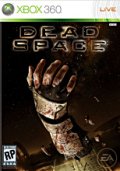
Format:
360
Genre:
Shooting
Style:
Thirdperson
Singleplayer
Buy/Support:
Support Mark, click to buy via us...
Other GamePeople columnists have reviewed this from their perspective - huh?:
Scared Gamer (360)
Movie Gamer (PS3)
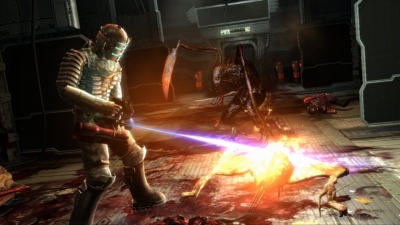
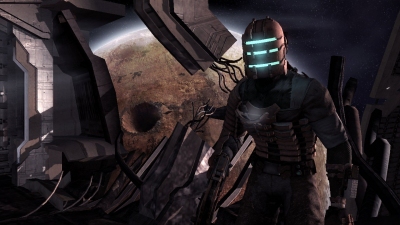
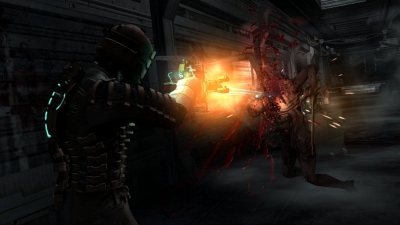
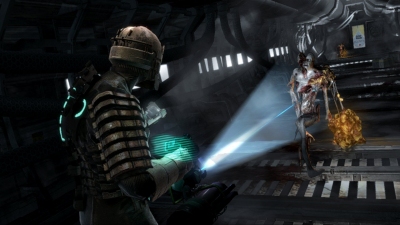

Further reading, films and books that create similar stories:
Dead Space 360 welds together survival horror and science fiction to create a dark, oily futuristic nightmare. While the atmosphere is excellent, the heavily-scripted story and punishing set-pieces left me stuck in a dead end.
The name of protagonist Isaac Clarke suggests that Dead Space's two great influences are the classic SF of Isaac Asimov and Arthur C Clarke, which suggests cosmic scope and big human issues.
In fact, it would have been more appropriate to call the game's silent, bucket-headed hero Ridley Mikami, as Dead Space is far more influenced by two darker, pulpier sources: Ridley Scott's Alien, and Shinji Mikami's Resident Evil 4.
The influence of Scott's movie is obvious, the endless, clanking engineering levels of the spaceship Ishimura in Dead Space evoking the similar environments of Alien's Nostromo. None of this is new territory for games, of course, but Dead Space does an excellent job of recreating the atmosphere of the first Alien film, whereas most games homage the bombast of James Cameron's Aliens instead.
Clarke's status as an engineer also calls back to the blue-collar characters of the movie, although Harry Dean Stanton never got to wear anything as snazzy as Isaac's upgradeable protective armour, with its holographic display and glowing spine. There are also nods to films which have followed in Alien's lineage, particularly the pseudo-religious overtones of Event Horizon.
Comparisons with Resident Evil 4 are equally flattering: in spite of the huge, multi-format success and critical acclaim poured on Resi 4, no-one has been able to emulate it successfully. Few games have tried its over-the-shoulder viewpoint, even less have brought anything close to the blockbuster gloss that made Capcom's game sing.
The influence of Scott's movie is obvious.
Dead Space does so, and in the process marks new ground as a western survival horror game that ranks amongst the best of a genre dominated by Japanese titles. Aside from the similar viewpoint, it also hits a lot of Resident Evil 4's bases in terms of its balance of frantic skirmishes and large-scale boss battles, all delivered with superior polish.
Dead Space is not without its innovations. While there have been SF survival horrors before, none used the genre as a source of such effective game devices as Dead Space's zero-gravity and zero-atmosphere sections. The former in particular provide some spectacular moments as Isaac launches himself across vast open spaces, and a real contrast to the game's mostly constrained corridors.
Then there's the game's monsters, the necromorphs. Alien beasts that grow from the corpses of humans, they're a suitably grotesque cross between HR Giger's designs and that survival horror staple, the zombie. Their regenerating flesh provides the twist to the game's combat: necromorphs can't be shot in the traditional style, they need to be dismembered, their limbs cut off until they've not got enough bits attached to regenerate from.
The endless, clanking engineering levels of the spaceship Ishimura in Dead Space evoking the similar environments of Alien's Nostromo.
Mostly, these are suitably threatening creations that can be diced at will. However, at significant moments truly powerful necromorphs are thrown in that constantly regenerate and can't be killed, only stalled. It was one such boss battle - a timed section where Isaac is trapped in a room with one such unkillable beast, and a ton of smaller necromorphs - that stopped me in my tracks and ensured I never got more than halfway through Dead Space, as much as I enjoyed it.
For me, that boss battle was unscaleable. Now, what I wanted to do was find a different route that allowed me to use the game's opportunities for progression - a weapons retooling system and the opportunity to pay for armour upgrades - to prepare myself better for that fight. Unfortunately, Dead Space may offer the illusion of development and flexibility, but its story is actually pretty linear: there are few opportunities to go off and buff your stats, grind a few smaller necromorphs and return to a major conflict better prepared.
It's a shame, as I was really enjoying Dead Space, but I neither regret playing what I did, nor giving up when I did. I know an impassable difficulty spike when I hit the Game Over screen twenty times in a row. In space, the one thing that can stop you dead is uneven game design.



Mark Clapham writes the Story Gamer column.
"I love a good story. Games tell many different stories: the stories told through cut scenes and dialogue, but also the stories that emerge through gameplay, the stories players make for themselves."
Here are the games I've been playing recently:
© GamePeople 2006-13 | Contact | Huh?

|
Family Video Game Age Ratings | Home | About | Radio shows | Columnists | Competitions | Contact
With so many different perspectives it can be hard to know where to start - a little like walking into a crowded pub. Sorry about that. But so far we've not found a way to streamline our review output - there's basically too much of it. So, rather than dilute things for newcomers we have decided to live with the hubbub while helping new readers find the columnists they will enjoy. |
Our columnists each focus on a particular perspective and fall into one of the following types of gamers:
|